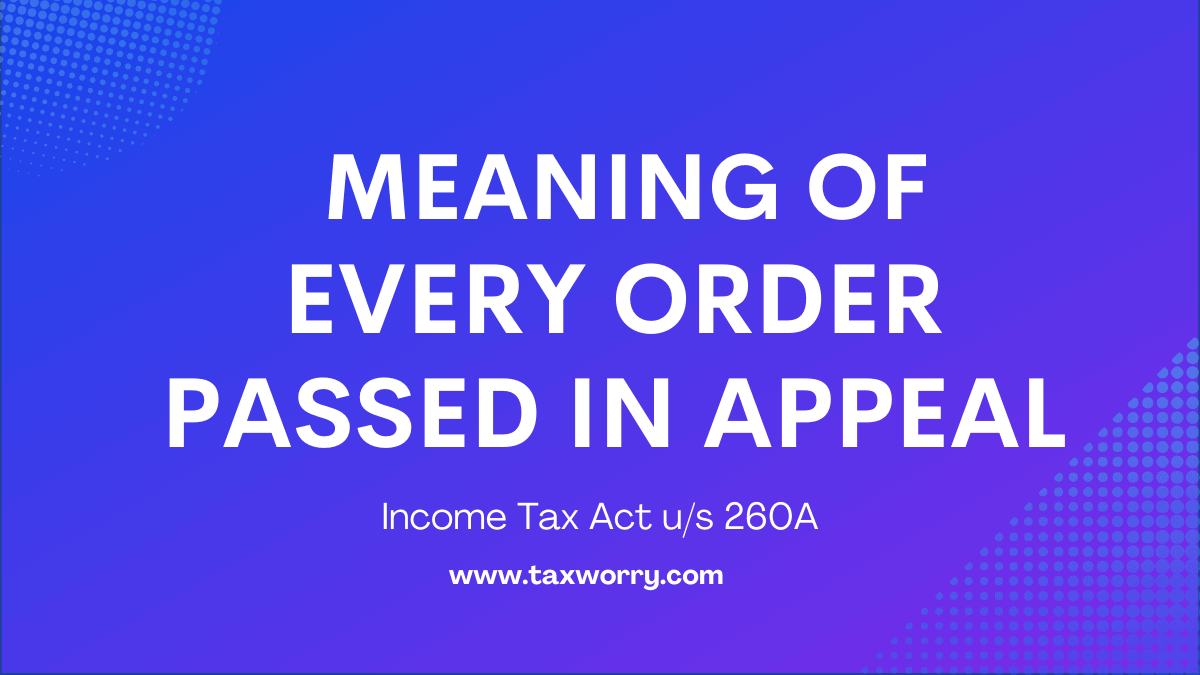Meaning of tax terms
Meaning of “Every order passed in appeal”
The meaning of every order passed in appeal under section 260A of the Income Tax Act is not defined in the act itself. But we can take guidance from decisions by various high courts. Here are excerpts of courts orders in which the Hon’ble High Court tried to explain the meaning of every order passed in appeal.

Meaning of every order passed in appeal defined by court
The phrase ‘every order passed in appeal’ used in section 260A of the Income Tax Act came up before various high courts as detailed under :
1. Hon’ble Bombay High Court explained the meaning of ‘every order passed in appeal’ while delivering judgment in Zenith Ltd. Vs. Dy.CIT [2004] 271 ITR 135 (Bom.) as under :
Meaning: The expression “every order passed in appeal” cannot be construed to take in its fold all interlocutory orders that may be passed by the appellate tribunal, during the pendency of the appeal, particularly such orders which are procedural in nature.
2. Hon’ble Allahabad High Court explained the meaning of ‘every order passed in appeal’ while delivering judgment in Rajesh Agarwal HUF Vs. CIT [2014] 51 taxmann.Com 26 as under :
Meaning: The words ‘every order’ do not mean an interim order or an order passed on a miscellaneous application. It means a final order disposing of the appeal.
Section 260A of Income Tax Act
Appeal to High Court.
260A. (1) An appeal shall lie to the High Court from every order passed in appeal by the Appellate Tribunal before the date of establishment of the National Tax Tribunal, if the High Court is satisfied that the case involves a substantial question of law.
(2) The Principal Chief Commissioner or Chief Commissioner or the Principal Commissioner or Commissioner or an assessee aggrieved by any order passed by the Appellate Tribunal may file an appeal to the High Court and such appeal under this sub-section shall be—
(a) filed within one hundred and twenty days from the date on which the order appealed against is received by the assessee or the Principal Chief Commissioner or Chief Commissioner or Principal Commissioner or Commissioner;
(b) [***]
(c) in the form of a memorandum of appeal precisely stating therein the substantial question of law involved.
(2A) The High Court may admit an appeal after the expiry of the period of one hundred and twenty days referred to in clause (a) of sub-section (2), if it is satisfied that there was sufficient cause for not filing the same within that period.
(3) Where the High Court is satisfied that a substantial question of law is involved in any case, it shall formulate that question.
(4) The appeal shall be heard only on the question so formulated, and the respondents shall, at the hearing of the appeal, be allowed to argue that the case does not involve such question :
Provided that nothing in this sub-section shall be deemed to take away or abridge the power of the court to hear, for reasons to be recorded, the appeal on any other substantial question of law not formulated by it, if it is satisfied that the case involves such question.
(5) The High Court shall decide the question of law so formulated and deliver such judgment thereon containing the grounds on which such decision is founded and may award such cost as it deems fit.
(6) The High Court may determine any issue which—
(a) has not been determined by the Appellate Tribunal; or
(b) has been wrongly determined by the Appellate Tribunal, by reason of a decision on such question of law as is referred to in sub-section (1).
(7) Save as otherwise provided in this Act, the provisions of the Code of Civil Procedure, 1908 (5 of 1908), relating to appeals to the High Court shall, as far as may be, apply in the case of appeals under this section.
In this article, you can get guidance from high courts on the meaning of every order passed in appeal under section 260A of the Income Tax Act.
Updated up to Finance Act 2021
